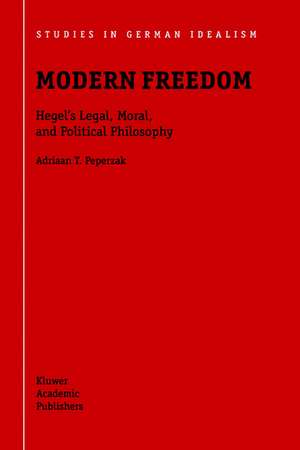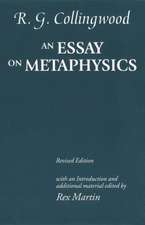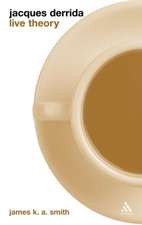Modern Freedom: Hegel’s Legal, Moral, and Political Philosophy: Studies in German Idealism, cartea 1
Autor Adriaan T. Peperzaken Limba Engleză Paperback – 30 noi 2001
| Toate formatele și edițiile | Preț | Express |
|---|---|---|
| Paperback (1) | 1835.53 lei 6-8 săpt. | |
| SPRINGER NETHERLANDS – 30 noi 2001 | 1835.53 lei 6-8 săpt. | |
| Hardback (1) | 1841.68 lei 6-8 săpt. | |
| SPRINGER NETHERLANDS – 31 iul 2001 | 1841.68 lei 6-8 săpt. |
Din seria Studies in German Idealism
-
 Preț: 407.19 lei
Preț: 407.19 lei - 18%
 Preț: 789.20 lei
Preț: 789.20 lei - 15%
 Preț: 638.89 lei
Preț: 638.89 lei - 19%
 Preț: 542.50 lei
Preț: 542.50 lei - 18%
 Preț: 949.10 lei
Preț: 949.10 lei - 18%
 Preț: 728.28 lei
Preț: 728.28 lei - 15%
 Preț: 646.62 lei
Preț: 646.62 lei - 15%
 Preț: 652.49 lei
Preț: 652.49 lei -
 Preț: 387.75 lei
Preț: 387.75 lei - 18%
 Preț: 792.19 lei
Preț: 792.19 lei - 24%
 Preț: 796.86 lei
Preț: 796.86 lei - 18%
 Preț: 786.84 lei
Preț: 786.84 lei - 15%
 Preț: 643.00 lei
Preț: 643.00 lei - 18%
 Preț: 791.40 lei
Preț: 791.40 lei - 15%
 Preț: 642.83 lei
Preț: 642.83 lei - 18%
 Preț: 951.29 lei
Preț: 951.29 lei - 18%
 Preț: 1231.47 lei
Preț: 1231.47 lei - 18%
 Preț: 955.25 lei
Preț: 955.25 lei - 15%
 Preț: 646.94 lei
Preț: 646.94 lei - 18%
 Preț: 957.62 lei
Preț: 957.62 lei - 18%
 Preț: 1116.57 lei
Preț: 1116.57 lei
Preț: 1835.53 lei
Preț vechi: 2238.44 lei
-18% Nou
Puncte Express: 2753
Preț estimativ în valută:
351.21€ • 366.74$ • 290.03£
351.21€ • 366.74$ • 290.03£
Carte tipărită la comandă
Livrare economică 15-29 aprilie
Preluare comenzi: 021 569.72.76
Specificații
ISBN-13: 9781402002885
ISBN-10: 1402002882
Pagini: 706
Ilustrații: XXVI, 675 p.
Dimensiuni: 155 x 235 x 37 mm
Greutate: 0.98 kg
Ediția:2001
Editura: SPRINGER NETHERLANDS
Colecția Springer
Seria Studies in German Idealism
Locul publicării:Dordrecht, Netherlands
ISBN-10: 1402002882
Pagini: 706
Ilustrații: XXVI, 675 p.
Dimensiuni: 155 x 235 x 37 mm
Greutate: 0.98 kg
Ediția:2001
Editura: SPRINGER NETHERLANDS
Colecția Springer
Seria Studies in German Idealism
Locul publicării:Dordrecht, Netherlands
Public țintă
ResearchCuprins
Preface.- Abbreviations.- Metaphysics?.- Philosophy and Historical Reconstruction.- Purpose.- Systematic Connections.- Student Notes.- Genetic Connections.- Sources.- Texts and Translations.- Exegesis.- Commentary.- Obscurities.- Reconstruction.- The Place of the Rechtsphilosophie.- The Historical Context.- Plan.- A Selection of Studies.- I. LOGIC.- Truth.- Reason (Vernunft) and Intellect (Verstand) (Enc A 1–3).- Aristotle on Thought.- The Identity of Thought and Being.- Onto-theo-logy.- Hegel’s Logic and Its Role in His Philosophy of Right.- Comprehension.- Deduction.- Self-Determination.- Concept-Judgment-Syllogism.- Finitude and Infinity.- Sollen.- Hegel’s Pantheism.- From Substance to Subject.- The Logic of the Grundlinien.- Plan and Procedure.- II. SPIRIT.- The Context of Right (Grl 1–2 and 4).- Spirit (Enc A 299–399).- Schema of the Encyclopedia.- The Abstract Concept of Spirit (Enc A 299–305).- Philosophy of Spirit (Enc A 305–307).- Phenomenology and Philosophy of Spirit (Enc A 329–362).- Consciousness (Enc A 329–334).- How Consciousness Becomes Rational (Enc A 335–363).- Interpretation of Enc A 345–362.- Spirit (Enc A 363).- The Concept of Spirit (Enc A 363–366).- The Identity of Intelligence and Will (Enc A 366–388).- III. FROM FREE WILL TO RIGHT.- The Subject Matter of the Philosophy of Right (§§ 1–2).- Natural and Positive Right (§ 3).- Spirit-Will-Right (§ 4).- The Deduction of Right in Grl 1–33 and Enc A 388–401.- The Will as Practical Reason (Enc A 386–387).- The Deduction in Grl 1–32.- Résumé (Grl 5–30).- A Schematic Overview (Grl 1–33).- Right (Grl 29–30).- Method (Grl 31–32).- Division (Grl 33).- IV. PERSON AND PROPERTY.- Immediate Right (§§ 34–39).- Sollen (§ 36).- The Foundation of Abstract Right(§ 36).- The Differentiation of Immediate Right (§ 40).- Property (§§ 41–70).- Intermezzo.- Life, Body, Property (§§ 47–48).- The Genesis of Property (§§ 49–52).- Personality and Interpersonality (§§ 49R and 51).- Rethinking Private Law (§§ 53 ff.).- Singularity or Mutuality?.- Discussion.- Appropriation (§§ 54–64).- Slavery (§§ 35R, 57R, and 66R).- V. CONTRACT AND CRIME.- Contract (§§ 71–81).- Crime and Punishment (§§ 82–103).- The Fragility of (Abstract) Right (§ 81).- VI. MORALITY.- Morality in Enc (1817) §§ 415–429.- Morality in the Grundlinien §§ 103–140.- VII. SITTLICHKEIT.- The Concept of Sittlichkeit (§ 142).- The Structure of §§ 142–156.- Analysis.- Consequences for Moral Behavior and Ethics.- Hegel’s Concrete Ethics.- VIII. THE FAMILY.- Love (§§ 158–168).- Unity and Dispersion (§§ 169–172 and 178–181).- Education (§§ 173–177).- IX. SOCIETY.- Civil Society According to the Encyclopedia (BC 518–538).- X. THE STATE.- The State and “The State” (§§ 257–260).- The State Is Not a Contract: Part One (§§ 258R and 75).- Philosophy and History (§§ 258R and M-32).- The State Is Not a Contract: Part Two (§ 258R).- Against Historicism (§ 258R and note).- State-Family-Civil Society (§§ 261–265).- Constitution and Political Disposition (§§ 266–270).- Politics and Religion (§ 270R).- Discussion About Constitutional Law (§§ 271 ff.).- Constitution (§§ 271–273).- The People (§ 274).- The Constitutional Monarchy (§§ 265–267; 272–274).- The Rational Organization of the State (§§ 260–274).- The State Is a Monarchy (§§ 275–286).- Hereditary Monarchy (§§ 280–281).- Universality and Particularity of the Monarch (§§ 283–286).- The Monarch According to the Course of1817–18.- The Government (Regierungsgewalt, §§ 287–297).- The Legislative Power (§§ 298–314).- The Democratic Element (§§ 301–303).- The Political Function of the Stände (§§ 303–314).- Actuality and Reform.- Public Opinion (§§ 315–319).- Freedom of the Press (§ 319).- The State is a Conclusion of Conclusions.- The Sovereign Nation State (§§ 320–329).- XI. INTERNATIONAL POLITICS.- The International Order (§§ 330–333).- War (§§ 334–339).- Humanity and the Nations (§§ 336–337).- Wartime Law (§§ 338–339).- Transition to World History (§ 340).- XII. WORLD HISTORY.- Weltgeschichte (§§ 341–342).- History and Wisdom (§ 343).- The Nations (§§ 344–351).- World-Historical Individuals (§ 348).- Nation-States and Other Peoples (§§ 349–351).- Four Realms (§§ 352–360).- XIII. ETHICS AND RELIGION.- The State Knows What It Wills (§§ 257–270).- Religion (Enc A 453–471).- Religion and State (Grl 270R).- The Principle of Protestantism (Preface, §270R).- National State and Universal Religion.- Freedom of Religion? (§ 270R).- EPILOGUE.- The Nation State.- Individuals.- In tersubjectivity.- Nationalism and Humanity.- Right and Love.- Perfection and Imperfection.- Spirit as Self-Appropriation.- Tasks.



















